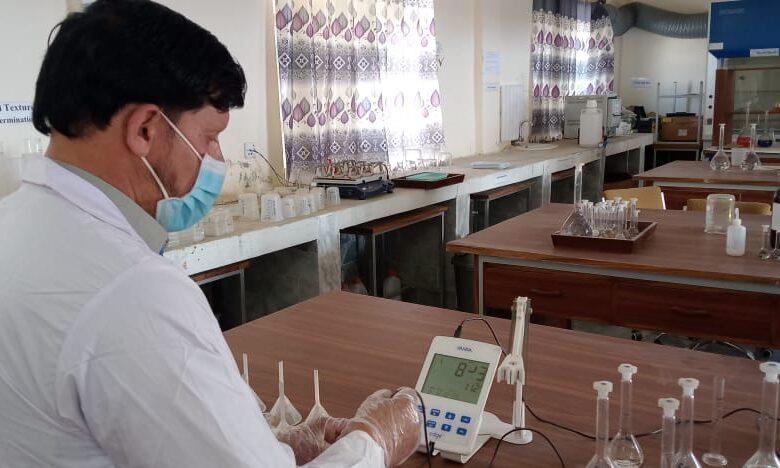
Empowering Agriculture: Bajaur Soil Testing Lab Revolutionizes Farming Practices
However, upon learning from Agriculture Department officials about the Soil Testing Laboratory established in Inayat Clay, he decided to test soil samples from his farm. The results revealed highly acidic soil with a nitrate deficiency, impacting yields. Following the recommendations of the Research Officer, Shafi adopted corrective measures, resulting in a significant increase in production.
Shafi owns four acres of land, with water available for irrigating two acres while the rest relies on rainfed cultivation. He has dedicated two acres to orchards of orange, olive, and plum, alongside cultivating various vegetables such as tomatoes, onions, cucumbers, and seasonal crops like wheat and maize. This agricultural land serves as his sole source of livelihood.
Muhammad Ilyas, a farmer from Sheikh Maino village, considers himself fortunate to have received soil test results from the Bajaur Soil Testing Laboratory. He highlighted the convenience provided by this facility, especially compared to the crowded conditions at Tarnab Farm Peshawar.
Ilyas expressed satisfaction with receiving results within a week, a significant improvement. Leasing agricultural land annually in a tribal area, he faced low productivity despite using various fertilizers. The test results indicated the need for Dhirani fertilizer exclusively, raising hopes for increased production. He urged the government to establish soil testing laboratories at every tehsil level to support farmers.
Testing Capacity of Bajaur Soil Testing Laboratory
Hamad Khan, Research Officer at the Bajaur Soil Testing Laboratory, stated that the facility currently conducts eight basic soil tests, including the crucial soil pH test. This test, also known as the soil fever test, is vital for agricultural production.
Additionally, an EC test assesses salt concentration, as imbalances can hinder the nutrient intake of crops, vegetables, and plants. The laboratory also analyzes nitrogen, potassium, phosphorus, organic matter, and lime levels in agricultural soil, totaling 16 tests for comprehensive information.
Hamad emphasized the lab's commitment to gradually expanding its testing capabilities, particularly addressing prevalent high pH issues in paddy soils.
Procedures for Soil Sampling
According to Research Officer Hamad, the laboratory provides results within two days to individuals submitting soil samples for testing, offering thorough guidance to farmers. To ensure accurate testing, farmers are advised to collect soil samples from 10 to 20 cm depth at 4 to 6 locations in their fields before bringing them to the laboratory.
Advantages of Soil Testing Laboratory
Dr. Roshan Ali, Senior Soil Fertility Scientist, and Meteorologist at Swat Agricultural Research Institute highlights the analogy between soil tests and medical examinations for humans and animals.
Just as doctors prescribe medicines based on health tests, soil testing determines soil properties, deficiencies, and excess components. Essential elements in the soil, such as magnesium, calcium, iron, nitrate, potassium, and phosphorus, impact crop, vegetable, and fruit production.
Farmers, often unaware of their soil's specific needs, apply generic fertilizers. The soil testing laboratory in Bajaur aims to address this by providing farmers with tailored insights into their soil composition and nutrient requirements, optimizing fertilizer application for enhanced yield.
Shortage of Staff Problem in Bajaur Soil Testing Laboratory
Research Officer Hamad underscores the challenges faced by the Bajaur Soil Testing Laboratory due to a shortage of staff. With only a three-member team – two research officers and a clerk – the laboratory struggles to meet the growing demand for its services.
Hamad emphasizes the urgent need to fill ten additional staff positions to efficiently handle the influx of soil samples, especially from both Bajaur and the Mohmand district. Field visits, essential for assessing the impact of suggestions on farmers' yields, contribute to delays in laboratory operations. Addressing the staffing shortage is crucial to enhancing service delivery to the local farming community.
Lack of Awareness Among Farmers about Soil Testing Laboratory
Research Officer Hamad points out the prevailing lack of awareness among farmers regarding modern agriculture and soil testing, hindering optimal production. To address this issue, Hamad conducts two awareness seminars annually, inviting farmers from different areas of Bajaur. The seminars educate farmers on the significance of soil testing laboratories and modern agricultural practices.
Additionally, Hamad engages with individual landlords to raise awareness. He urges landowners to leverage the soil testing facility to maximize agricultural production and benefit from tailored insights into their soil composition. Increasing awareness is vital for driving positive changes in farming practices.

Legal Disclaimer:
MENAFN provides the
information “as is” without warranty of any kind. We do not accept
any responsibility or liability for the accuracy, content, images,
videos, licenses, completeness, legality, or reliability of the information
contained in this article. If you have any complaints or copyright
issues related to this article, kindly contact the provider above.

















Comments
No comment